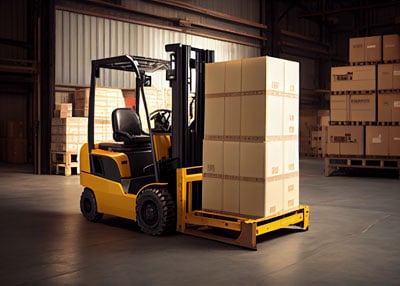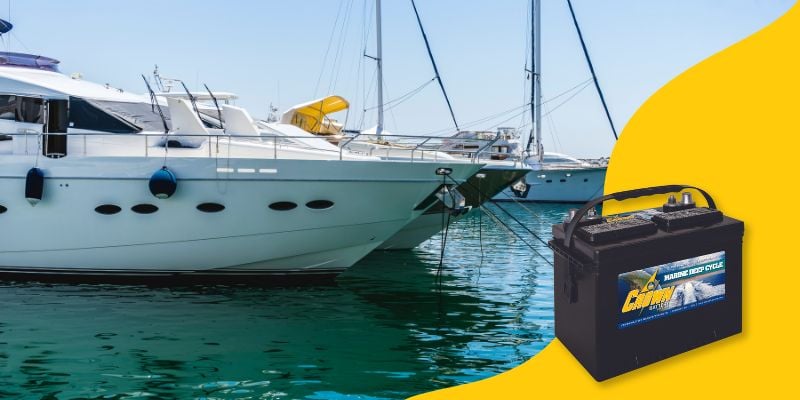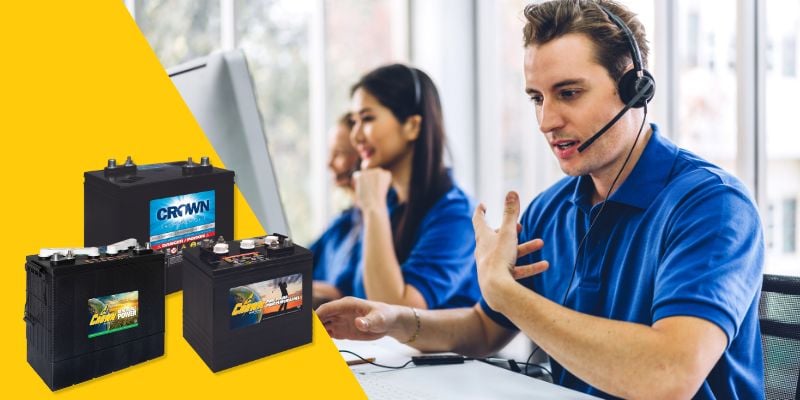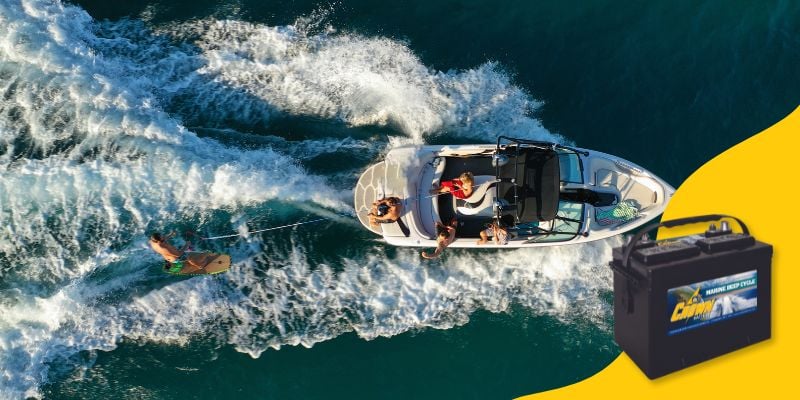If your passion is boating, knowing what you need to ensure your boat is safe, comfortable, and enjoyable is important. One of the most vital components for ensuring safety and performance is a marine battery. Marine batteries are designed to provide reliable power to boats and other marine applications. They are built to withstand the harsh marine environment, including exposure to saltwater, vibration, and extreme temperatures. If you are preparing for the upcoming 2023 boating season, keep reading for a crash course on marine batteries.
What are Marine Batteries?
Marine batteries are special starter and deep-cycle batteries designed for use in boats and other recreational equipment used on water. They are used in place of traditional lead-acid automotive batteries and employ features that support specific requirements of your boat’s engine and running systems. Some marine batteries protect against brutal operating conditions that include vibration, high temperatures, and include maintenance-free plate designs that minimize battery corrosion and fluid loss.
The best performing marine batteries are typically made with thicker and heavier plates to withstand the harsh operating conditions of marine applications. Certain types of products, such as AGM batteries, feature sealed and dryfit construction to deliver higher capacities and prevent electrolyte leaks to reduce the risk of damage to your equipment. Choosing the right type of marine battery is important to support your vessel's specific needs and to ensure reliable battery performance and longevity.
Knowing the differences between marine starter and deep cycle batteries are important considerations before putting your boat into the water this season. For example, marine starter batteries are designed to provide a burst of high-energy power for engine starting and to provide nominal reserve capacity when the engine is running at full power; marine deep cycle batteries are designed to deliver a steady stream of energy over a longer period of time. They are commonly used to power trolling motors, livewell pumps and bait tanks, depth finders, fish finders, radios, and other electronic devices that run when your boat’s motor is powered off
Types of Marine Batteries
Marine batteries come in different types and configurations, each suited for specific marine applications. Here are the most common types of marine batteries:
FLA (Flooded Lead-Acid) Batteries
These are the most traditional and affordable marine batteries. Flooded lead acid batteries are considered to be the best value, and they're also easy to handle and install. FLA starter batteries usually employ maintenance-free designs, while FLA deep cycle batteries require regular maintenance, including checking fluid levels and adding distilled water as needed.
AGM (Absorbent Glass Mat) Batteries
AGM battery design uses a fiberglass mat to absorb and immobilize electrolyte added to batteries during the production process, making them dryfit, spill-proof and maintenance-free. They are more expensive than flooded batteries but offer higher electrical capacity, increased durability, and longer life and can be mounted upright or on their sides.
Gel Batteries
Gel battery construction is similar to FLA batteries, but these batteries use gelled electrolyte instead of liquid electrolyte. The batteries are sealed and valve-regulated, so they are also spill-proof, maintenance-free, and are usually installed to replace FLA deep-cycle batteries. However, they are substantially more expensive than both flooded and AGM batteries.
Additionally, gel batteries have the highest energy density (how much power they can store) and are considered more reliable than other types of batteries. They're also less likely to spill acid and damage your boat if they're accidentally tipped over or jostled around while you're on the water.
Lithium-Ion Batteries
Lithium-ion batteries are becoming increasingly popular in marine applications due to their low weight-to-energy density ratio. However, lithium-ion batteries are more expensive than other types of batteries, and, according to the website of BoatU.S., “any boater considering installing Li-ion batteries on their vessel needs to understand the [safety] risks and the costs, not just the benefits.”
Marine Battery Size and Capacity
The sizing references for marine batteries follow industry standard BCI Group Size specifications, while electrical capacity references are measured in ampere-hours (Ah) and Marine Cranking Amperes (MCA). The larger the Ah or MCA rating, the more energy the battery can store. Choosing a battery with enough capacity to be in compliance with your boat’s engine starting requirements — or to power all of your onboard devices ensures you always have the power and peace of mind needed to enjoy your time on the water.
Maintenance and Charging
You may have to perform regular maintenance and charging depending on your marine battery type. Here are some basic tips for maintaining and charging your marine battery:
- Check Fluid Levels: FLA Deep Cycle batteries require period electrolyte inspection and maintenance. Check the water level in the battery cells regularly, and if it's low, top it up with distilled water, making sure to add only enough water to cover the battery plates..
- Keep the battery clean: Dirt, grime, and corrosion can reduce the battery's performance and lifespan. Keep the battery and its terminals clean and free of corrosion.
- Use a battery charger: Use a battery charge maintainer /charger to charge your battery when it's not in use. Avoid overcharging the battery, which can damage it. Use a charger with a float mode, automatically maintaining the battery's charge at a safe level.
- Charge the battery after use: If you've used the battery, recharge it as soon as possible. Leaving the battery partially discharged for an extended period can reduce its lifespan.
By following these tips, you can help ensure that your marine battery is always in good condition and ready to provide reliable power.
Marine Battery Storage
If you're storing your boat for an extended period, taking proper care of the battery is important. Disconnect the battery and store it in a cool, dry place. Charge the battery to full capacity before storing it, and check on it periodically to ensure it's holding its charge.
How Long Do Marine Batteries Last
Marine batteries are designed to be used in a marine environment, so they're made to last longer than other types of batteries. A well-built and high-quality marine battery can last between 4 and 6 years, depending on how you use them. If you're using your boat only occasionally, it may last longer.
What Should I Look for in a Marine Battery?
When you're shopping for a marine battery, there are some things to keep in mind:
- Ensure the battery is rated to support your boat's engine size or to power the running systems in use on your equipment. Additional considerations for AGM (sealed and maintenance-free design) or FLA (filled with electrolyte and requires periodic maintenance) can be made based on your personal preferences or capabilities.
- Choose a battery that can tolerate temperature volatility. This means that even at low temperatures (sub-freezing temperatures) or extremely hot operating conditions, the battery can still provide enough power without being compromised by temperature.
If you are looking for a new marine battery, take the time to do your research and make sure you choose one that is right for your boat or watercraft. An excellent place to start is by reading online reviews from other boaters who have used the same type of battery for their vessel. You can also ask your local battery supply store about any brands they recommend based on customer feedback or what they've seen work best over time.
When selecting a marine battery, it's important to choose one designed specifically for your application that can withstand a marine environment's unique demands. Crown Battery's marine batteries are built to meet these requirements and are a good choice for Boat owners who prioritize reliability, ROI, durability, and safety.












